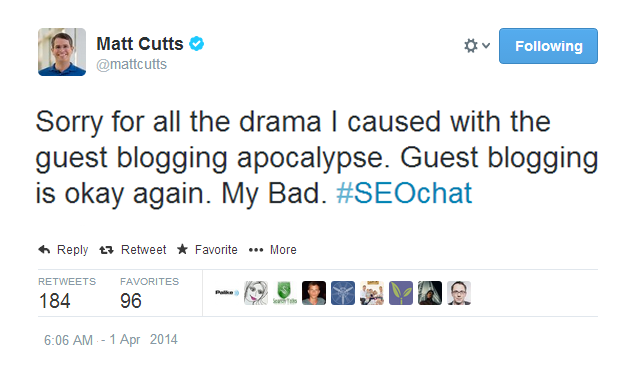SEO remains a fairly intricate and complicated digital marketing realm, and subsequently there are still a number of common SEO myths and misconceptions that float around the web.
So we’ve addressed some of the more damaging SEO myths, and why you need to forget all about them.
AdWords PPC boosts organic rankings
Utilising Google AdWords to appear at the top of the search results does not have any effect on your organic listings.
PPC is completely separate from organic, with different sets of data.
However, they do achieve the same end goals. Paid ads allow you to target more keywords and test certain campaigns, and allows brand exposure at the top of the search results. It’s also easier to measure ROI.
But PPC will not help with rankings overall – however it can give you a real insight into how search marketing can help you. Perhaps those that dabble in PPC have experienced better results from SEO down to the fact they can see which keywords produce conversions, and what they should be targeting.

Keywords aren’t important
A lot of people think that nowadays, having contextual and relevant content is all that matters. Whilst this is a huge priority, keywords are certainly not something to be ignored. Keywords remain a fundamental part of SEO.
After Google’s Hummingbird algorithm updated, people thought keyword targeting was on the way out. But it’s still as important as ever. But it’s all about searcher intent rather than keyword ratio.
When choosing keywords or phrases, consider what these people are looking to achieve. Creating content to meet the reason behind a search is now the end aim.
Keywords are still important in the following areas:
- Page Title
- Meta Description
- H1 Header
- Page content
- H2 headers
- Image alt text
Keyword research is still important, but it’s the over-optimisation and excessive keyword use in content that can be damaging.
Link building isn’t important
Link building as a practice has changed dramatically – but it hasn’t gone anywhere. It’s still one of the biggest signals search engines use to determine the authority and trust that is given to your website, which determines how you rank.
It’s certainly a lot more difficult now compared to when Google was just getting started. Low-quality, paid, or spammy links are much more harmful, as Google can give your website manual or algorithmic penalties.
What’s important to concentrate on, is getting quality links, and not a high quantity of links. If you can get natural and contextual links from trusted and relevant websites, that’s great. Getting numerous links from spammy or otherwise untrusted websites is not a good idea.
Marketers need to build links in natural ways, by offering up good value content that other websites will want to link to, and find other ways to attract links to your website for SEO.
Ranking first for a single word is all that matters
Some business owners may focus on ranking for one very vague and very wide key term. However, in many cases, it’s much more valuable to rank for other long-tail keywords.
Choosing your keywords based upon focused intent often drives better traffic than a certain obvious, vague term.
If your business was selling football boots, then ranking for the term “football” may seem enticing. But what good would ranking high for the term “football” achieve? People searching for this may be looking for the latest scores, sports news, or other forms of content. But ranking for a phrase such as “astro turf football boots” can be much more valuable, as people searching for this are looking to buy a specific item, and would offer higher chances of conversion.
SEO is a one-time thing
SEO is not something you can do once, and then ignore. SEO needs ongoing effort, in order to stay in-line with the latest algorithms from Google and other search engines, and also keep your website up-to-date.
Your website can lose rankings if it is left due to a number of reasons. This includes:
- Link degradation/link rot – Broken links can lead to a loss in rankings
- New pages – Google values fresh and updated content, so they aren’t sending users to old information
- Search engine algorithm updates – If Google updates its algorithm with new criteria, then it’s important to ensure you comply
- Competition moving on up – If your competition updates their websites, and is much newer with fresh content, they could easily outrank your dated website
SEO isn’t a priority anymore
Some people may think that SEO is dying out as more people use the web in smarter ways, know where to go, and are using search engines in new ways. However, on the flip side, as long as people use search engines, SEO will remain relevant and critical to businesses.
Even in the future, when people are using voice to search or other methods, search engines will still be trawling websites to bring up the most relevant content for users. And these results will be created due to optimised websites, which will need good SEO to get the best rankings.
However the internet and search engines evolve, there will be new guidelines and updates that come along with it. And no doubt that SEO as a practice will evolve alongside it – which is why it’s so important to stay on top of the latest SEO trends.
No doubt there will be new channels and new networks in the future – but existing search engines, algorithms, and methods will continue to develop into the future. Organic search still delivers the majority of traffic to most websites, and so it is still a priority when marketing your website online.
Guest posts are dead
Guest posts are not dead. Matt Cutts scared a lot of marketers by hinting towards the fact – but he was simply saying that low-quality guest posts aiming to simply get links for the sake of it were a bad idea.
Guest posts on irrelevant or spammy websites are a bad idea. It’s good when you could see your target audience taking an interest in the site in question, meaning it could be an asset to your brand for exposure and perhaps some traffic.
Good guest posts should be all about focussing on providing the reader with value, and building a relationship. If your only aim is to get a link back to your site, this is bad, and Google won’t like this idea. Otherwise, building your brand with contextual links can be very good for your SEO. It’s also worthwhile not to title your post with the term “guest post”, as it at least won’t be flagged up by Google.

Fake reviews are safe
There are still some businesses that don’t think fake reviews can be detected. Well, that’s increasingly untrue. Google can detect spam and unnatural behaviour, and it’s a very bad move to intentionally give your own business good reviews online.
Even then – if Google doesn’t manage to detect your fake reviews, then there’s always the possibility a member of the public will. And the fallout of that is most likely far worse. With how often bad business moves go viral online these days, it’s never going to be worth the risk.
Google do have a history of penalising any unnatural links or spam reviews it detects. Alongside this, offering incentives to give good reviews can be detected as spam.
The best way to get good reviews is to encourage your customers to leave reviews, whether it’s through follow up emails or other links to leave reviews on your websites. If your local rankings are particularly important, then it’s not worth any risks.
If you’d like to discuss your SEO strategy with the digital marketing team here at Xanthos, then do get in touch or call us on 08450 740 068








